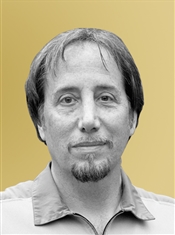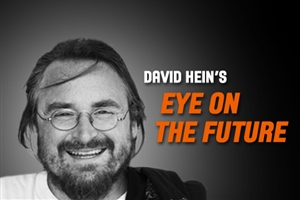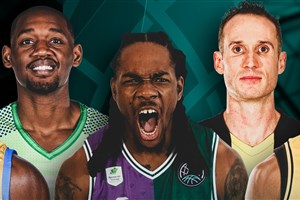
The Wei way - We prepared for the worst, but still prayed for the best
CHARLOTTE (Steve Goldberg's Wheel World) - How hard have you worked to achieve your dream? How big were the obstacles you had to overcome?
Every struggle has its merit. Every tale of accomplishment in the face of adversity will differ for sure but each is worth telling as there is always something more we can learn about the human spirit.
Wheelchair basketball, as with most any sport, is fertile ground for accounts of courage and strength and determination. Part of my charter with this column is to relay some of those to you. Here's one that comes to me through Jeremy Schack, a media empire in the making as he works to bring awareness to the adaptive sports programs at the University of Texas-Arlington.
Jeremy shared an article on Facebook that Sanna Arman, a law student at the University of Surrey in the United Kingdom had written for Face2FaceAfrica.com.
Malat Lueth Wei will play wheelchair basketball on scholarship in 2015 for the University of Texas-Arlington, well known as UTA. His path to get there has been a bit more arduous than most. Currently, he's in junior college working to improve his academic skills. His basketball skills have already taken him as high as the United States' U23 team which would have competed for gold in the last World Championship held in Ankara, Turkey had trouble across the nearby border in Syria not caused the USA to withdraw.
Unlike most of his classmates in high school, Wei had to learn to understand, speak, read and write English - along with everything else that comes with going to school - since he arrived in the United States some 10 or so years ago. Native speakers don't realize just how odd and confusing the rules of English grammar and spelling can be.
Now 20 years old, his journey started in the small town of Boma in Jonglei state, South Sudan. That geography alone would have been enough of an obstacle to overcome as the Sudan has become synonymous with civil war.
It wasn't. When he was three, Wei was diagnosed with polio, a disease that has been eradicated in most of the world through preventive vaccinations. But not all. Without access to proper medical facilities in Boma, the polio, which affects the spine's gray matter, brought paralysis.
Two years later, amidst the continuing strife, Boma came under attack and Wei's family fled east to Ethiopia, one of the neighboring countries that opened their doors to South Sudanese refugees.
The trek to the Dimma refugee camp traversed around two hundred miles. Though very young, Wei recalls being carried by his uncle across one of the treacherous rivers they had to breach on the way to safety.
He told Arman: "Many people died crossing it, and my family was lucky to have made it across." At night, "we slept in the jungle while we were being shot at by our enemies."
That's not your average lullaby.
Conditions in the camp would be abysmal but far better than the alternative of staying in Boma would have had. They were fortunate to have family already there who let them use one of the five huts they called home.
Wei did have a wheelchair but that didn't help when the rains came.
"I had to wait until the mud dried a little to then go play with my friends, by crawling, because the wheelchair I had couldn't roll in the mud."
When his friends played soccer, he had to use his hands. Yet he considered himself fortunate. And he was, because he had friends who he says, "accepted me for who I am."
"We fought, we laughed, played soccer, and enjoyed the refugee life. We prepared for the worst, but still prayed for the best. And everything they did, I did."
In 2004, Wei's family applied for asylum in the United States and in 2005 they left for America.
Landing in Houston, Texas, he began his education, not just from books but in a whole new culture. He was also introduced to wheelchair basketball where he played for the Houston TIRR Hotwheels and went to camp at UTA in 2009.
USA Paralympian and IWBF World Championship player Darlene Hunter recently shared a Winston Churchill quote that reads: "We make a living by what we get. We make a life by what we give."
Wei has told Garner that while leaving Sudan most likely saved his life, giving it meaning would be going back to help his people back in Sudan.
He told Arman: "I want to go back to South Sudan and start a wheelchair basketball team that will compete in the Paralympic Games one day."
But first he wants to represent Team USA at the 2016 Paralympics in Brazil and be the first South Sudanese athlete to represent America as well as his former country in wheelchair basketball.
Advocacy for sports is very important, he added, because "it gives the youth opportunities to do something positive, learn to work together as a team, (and) trust each other."
He learned that "you achieve more than you can alone, and most importantly, you build true friendships, which riches can't buy."
Wei believes that South Sudanese have to make sure they introduce the youth to sports at early points in their lives because sports is the key to connecting societies as well as eradicating tribalism, a central issue in South Sudan.
He believes in the power of sport to bring people together, to build relationships, which can then build "our nation as one strong country, not just in sports, but also in the education and political sectors."
His path has been demanding, and continues to be, but not in any way that will deter him.
In his own words: "Don't give up. You have come too far to give up now when you are close to your dreams. Never give up on your dreams, keep alive, and keep striving and working hard to make them a reality. When you think of giving up, think about why you started in the first place."
Steve Goldberg
FIBA
FIBA's columnists write on a wide range of topics relating to basketball that are of interest to them. The opinions they express are their own and in no way reflect those of FIBA.
FIBA takes no responsibility and gives no guarantees, warranties or representations, implied or otherwise, for the content or accuracy of the content and opinion expressed in the above article.
To help make this column as inclusive as possible, please send any national or international event information, story suggestions, or comments to wheelworldmail@gmail.com.

















